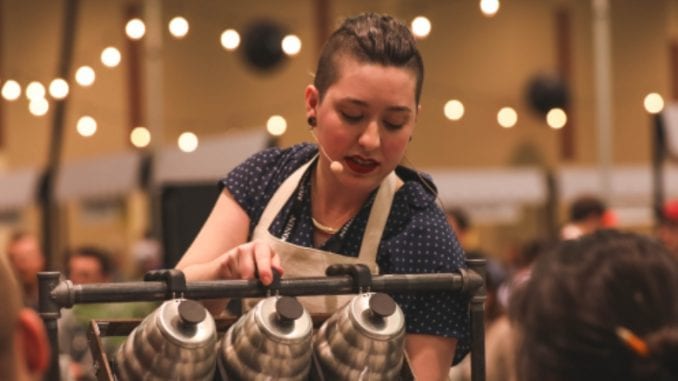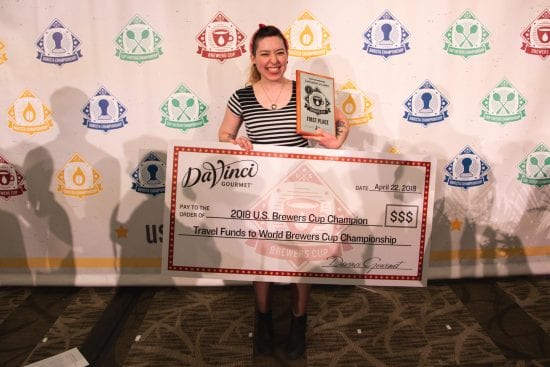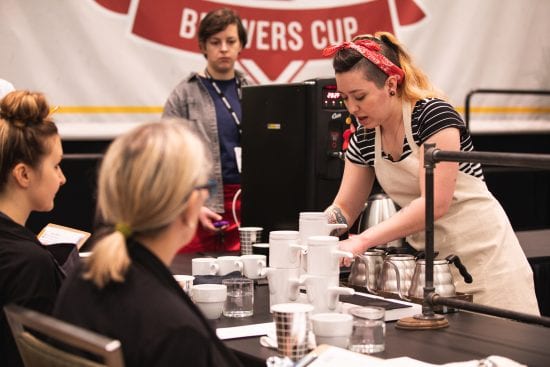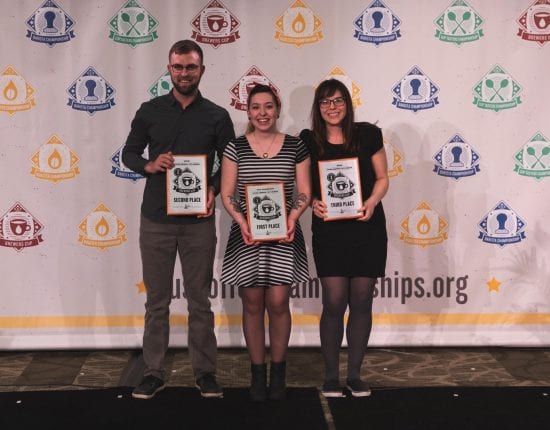
Becca Woodard of George Howell Coffee won the title of U.S. Brewers Cup champion on her first try. She talks about preparation, uplifting marginalized voices, and her first ‘a-ha’ moment in coffee.
BY ASHLEY RODRIGUEZ
BARISTA MAGAZINE ONLINE
Photos courtesy of Jake Olson for the SCA
Over the next few weeks, Barista Magazine Online will present a series of interviews with the winners and top finishers at this year’s United States Coffee Championships, which took place in Seattle in April. You can see a full list of winners along with a rundown of the first and second rounds of the barista competition, along with a livestream of the competition as well.
Four years ago, Becca Woodard had just started working in coffee. Now she’s the United States Brewers Cup champion, blowing away the judges and audiences with an amazing coffee from the Ninety Plus Gesha Estates in Panama and a routine brimming with innovative ideas and a call to address issues of marginalization and inclusivity in the coffee industry. Becca talks to us about her start in coffee, how she prepared for competition, and what feels important to her in the coffee industry.
Ashley Rodriguez: How did you first get into coffee? How did you end up in your current role?
Becca Woodard: I got my first coffee job almost exactly four years ago at a shop called Crema Cafe in the center of Harvard square in Cambridge, Mass. I was hired as the assistant manager but had to learn how to make espresso to cover breaks. That’s where I met Sal Persico and was introduced to George Howell Coffee. Sal was George Howell’s wholesale account trainer and the first person to talk to me about brew ratios and extraction percentages. At the time it was all total gibberish, but it got me hooked and needing to learn more.

I worked my way around a couple of different shops in the area, stepping away from management to learn as much as I could about the actual coffee. I always loved George Howell Coffee even when I wasn’t working with it, and in 2016 got hired at their Downtown Crossing shop when it first opened. I spent about a year there learning more than I thought possible until eventually Sal was moving on to work for Collaborative Coffee Source and I was fortunate enough to be able to take over for him here. The position has changed a bit in the past year and encompasses a little quality control as well as wholesale and in-house training and general wholesale account management.
AR: Do you remember your first “a-ha” moment in coffee, or any moments that made you reconsider the way you view coffee?
BC: That first training session I had at Crema Cafe was definitely an eye opener, but I would say my really big “a-ha” moment came the first time I visited Seattle a few years ago. I had barely scratched the surface on what coffee could taste like when I went on a coffee crawl and I got a shot of Harrar Ethiopian espresso from Victrola. The clear-cut sweet blueberry muffin note absolutely blew my mind! I ended up going back the next day and attended my first-ever cupping. After that trip I knew coffee was going to be a career for me.

AR: How did you approach training for competition? What was practicing and prepping like?
BC: Oh boy … I’m sitting here trying to come up with a response to this question, and it is really hard! There were seriously so many things that went into preparing for this competition and so many people. Since this was my first competition cycle, I called in all of the favors I possibly could, learned as much as I could, and put a whole lot of time into practicing (lots of late nights alone at the roastery). It was stressful, it was exhausting, and there were times I definitely wanted to give up, but in the end it all paid off.
AR: Tell us a little about your presentation. What did you want to tell the judges during your time on stage?
BC: My theme was all about systemic changes, both in our local communities and in the global coffee community. I wanted the judges to understand the extremely conscious choice I made to include each piece of information I included in my presentation. Being able to have a voice on the national competition stage was not something I took lightly, and being a queer woman, I couldn’t stand up there and not acknowledge the systemic issues that are currently making it hard for many people to feel safe and included in the specialty-coffee community. I knew I wanted to talk about these things before choosing my coffee.
Ending up with a coffee from a producer like Joseph Brodsky must have been some sort of divine intervention! If you’re not familiar with the practices of the Ninety Plus Gesha Estates in Panama, I strongly encourage everyone to read up on them. They are not only producing some incredible coffees, but they are changing the way coffee is grown and harvested, and making some serious positive systemic changes at origin. I hope to be able to mirror that in my involvement in the competition world of specialty coffee.

AR: How has training for competition changed the way you view coffee?
BC: I wouldn’t say it changed the way I view coffee as a beverage, but it definitely changed the way I interact with other coffee professionals. I’ve been able to meet some really incredible people over the past couple of months, a lot of which are hurt/othered/marginalized by the way the competitions are run, the decisions the SCA has made around the competitions, and by seeing an overwhelming amount of cis white men competing and winning year after year. I think we saw a tiny sliver of what is to come for future competition cycles this year with individuals talking about issues and sharing messages in their presentations. (Also, four of the six Brewers Cup finalists were women!)
AR: What do you want to say to the coffee industry? As the new U.S. Brewers Cup champion, what does it mean to you to be a leader in the coffee community?
BC: It’s funny to think of anyone seeing me as a leader; there are so many people I look up to in this industry who I’ve learned so much from and who inspire me. I want the coffee industry to know that I am still learning a great deal about coffee myself, and my role in all this. I hope to help make changes by using my voice while I have one. If I can help anyone working toward a more inclusive, approachable industry for LGBTQIA baristas, POC baristas, or any marginalized people, please do not hesitate to reach out.
We’ll be following up with Becca on Monday about the ins and outs of her coffee and presentation—including a device she invented to help her pour her kettles at the same time!

